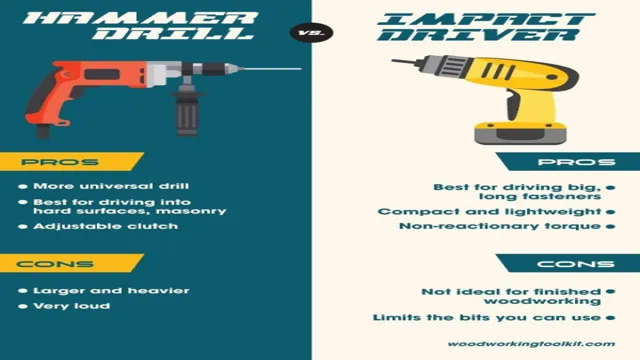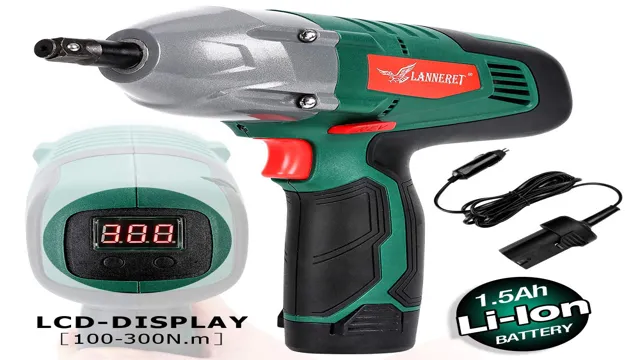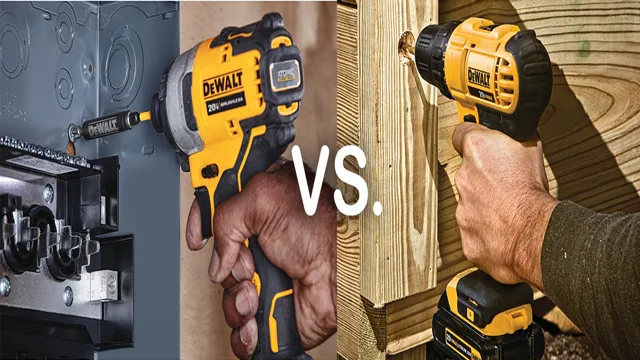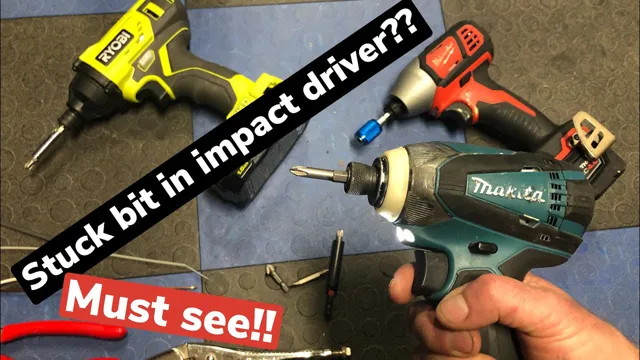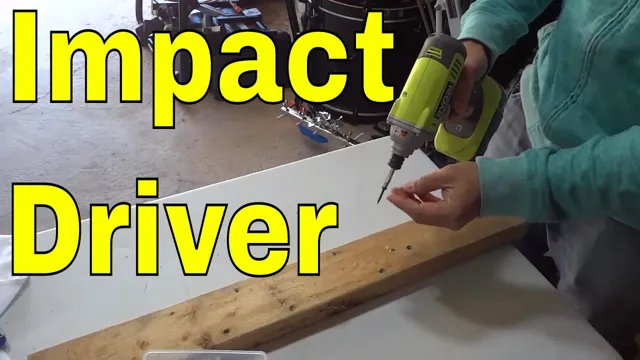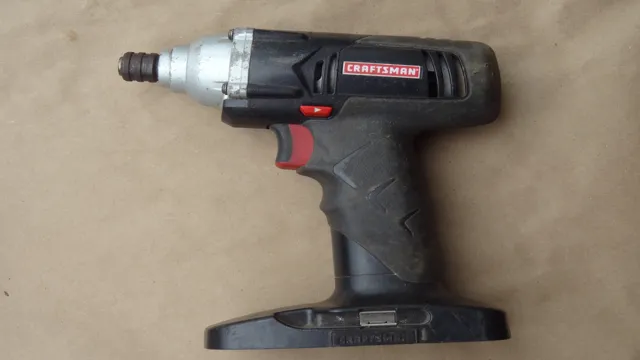Do I Need Impact Sockets for Impact Driver? The Essential Guide to Choosing the Right Socket
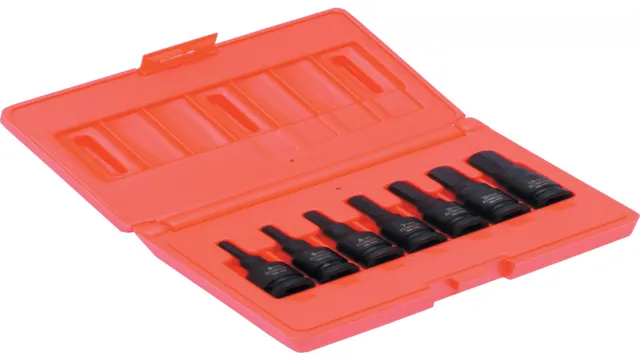
Impact drivers have become a go-to tool for many DIY enthusiasts and professionals alike. These powerful devices have the ability to tighten and loosen screws and bolts with a lot of force. But perhaps you’re wondering, do you need special sockets to use with it? Well, the answer is yes, and no.
Impact drivers can work with regular sockets but using them can lead to unnecessary wear and tear. This is where impact sockets come in. They are specifically designed to handle the force generated by impact drivers, ensuring that your tools last longer and work more efficiently.
In this blog post, we’ll dive deeper into the world of impact sockets and help you decide whether you need them for your impact driver.
Understanding Impact Drivers and Impact Sockets
If you plan on using an impact driver, then you should definitely invest in some high-quality impact sockets. The reason for this is that impact drivers are designed to exert an incredible amount of force and torque, and standard sockets simply won’t be able to handle this level of strain. Impact sockets, on the other hand, are specifically designed to withstand this kind of power and provide a firm grip on the fastener to prevent slippage or rounding.
They also feature a special construction that helps to distribute the force evenly, reducing the risk of damage to both the tool and the socket. So, to answer the question, yes, you absolutely need impact sockets if you’re using an impact driver. Don’t risk damaging your tools or your work – invest in the right equipment from the start.
What are Impact Drivers?
Impact drivers are versatile and handy tools that have become increasingly popular in the world of DIY and professional construction. They provide quick and effortless power, making it easy to drive screws and bolts into hard materials like wood or metal. They work by delivering concussive force and rotational power simultaneously, creating a burst of energy that is perfect for driving tough fasteners.
You can further enhance the functionality of impact drivers by pairing them with impact sockets. These are specially-designed sockets that are designed to stand up to the high torque and impact of an impact driver. They work together to make fastening tasks easier and more efficient, especially when dealing with stubborn or rusty nuts and bolts.
So if you’re looking for a powerful and efficient tool for your next project, consider investing in an impact driver and a set of impact sockets to get the job done right.
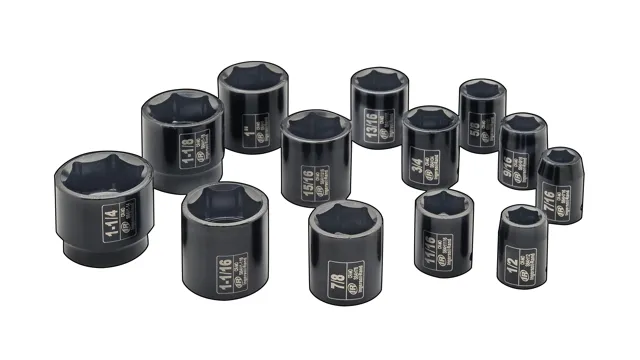
What are Impact Sockets?
Impact sockets are specialized wrench sockets specifically designed to be used with impact drivers. An impact driver is a tool used for driving screws, bolts, and nuts with a high amount of torque. The mechanism inside an impact driver works by delivering sharp, rotational blows to the fastener, which results in a high level of torque, making it an ideal tool for heavy-duty work.
However, the high level of torque can cause regular sockets to shatter or crack, which is why impact sockets are used. These sockets are made from hardened steel and have a black oxide coating to protect against rust and corrosion. Additionally, they have a thicker wall, making them more durable and able to withstand the high amount of torque delivered by the impact driver.
Using regular sockets with an impact driver can damage both the socket and the driver, so using the right tool for the right job is essential to ensure longevity and effectiveness of each.
Why You Need Impact Sockets for an Impact Driver
If you’re using an impact driver, then you’re going to need impact sockets. Regular sockets are not designed to handle the high torque and impact force produced by an impact driver, and they can easily crack or break under pressure. Impact sockets are made from high-quality steel alloys and are designed to absorb and distribute the force generated by the impact driver, making them much more resistant to damage.
So, yes, you do need impact sockets for your impact driver if you want it to work efficiently and avoid the risk of damaging yourself or your tools. Plus, investing in impact sockets can be a worthwhile long-term investment that will save you money in repairs and replacements down the line. So, it’s definitely worth considering if you’re serious about getting the job done right the first time.
Benefits of Using Impact Sockets with Impact Drivers
Impact sockets are an essential accessory for an impact driver. Using the appropriate socket ensures maximum performance and efficiency during projects. Impact sockets are designed to withstand the high-pressure burst of torque generated by an impact driver, making them perfect for heavy-duty jobs.
Additionally, their construction allows them to distribute stress evenly, preventing breakages and prolonging their lifespan. The versatility of impact sockets extends to their compatibility with a wide range of nuts, bolts, and screws, making them ideal for use on everything from automobiles to heavy machinery. Simply put, if you want to make the most out of your impact driver, get yourself an impact socket set and enjoy the benefits it brings.
How Impact Sockets Differ from Regular Sockets
Impact sockets are a type of socket that is designed specifically to be used with an impact driver. The key difference between impact sockets and regular sockets is their construction. Impact sockets are engineered to withstand the high torque and force generated by an impact driver, making them sturdier and more durable than regular sockets.
They are made from hardened steel or other durable materials and are often coated with a black oxide finish to prevent rust and corrosion. The thicker walls and deeper grooves of impact sockets are designed to grip and hold onto nuts and bolts more securely, preventing slipping and rounding off of corners. If you’re planning to use an impact driver for tasks like automotive repair or construction work, it’s essential to use impact sockets for the best results.
Regular sockets may not hold up under the high pressure and can pose a safety risk, so investing in a good set of impact sockets is always a smart choice.
Choosing the Right Impact Sockets for Your Impact Driver
If you’re using an impact driver for various tasks, the question might cross your mind – “do I need impact sockets for impact driver?” The answer is yes! Regular sockets are not designed to handle the high torque output of an impact driver. Impact sockets are specifically designed and engineered to endure high torque and sudden bursts of force that the impact driver produces. They are made of tough materials, such as forged chrome molybdenum steel, that can withstand the harsh conditions of repetitive impacts.
By using regular sockets with an impact driver, you risk stripping the socket, damaging the fastener, and even injuring yourself. Always make sure you have the right tools for the job to get the best results and avoid potential hazards.
Socket Size and Compatibility
When choosing the right impact sockets for your impact driver, socket size and compatibility are key factors to consider. The size of the socket you choose must correspond to the size of the nut or bolt you are trying to loosen or tighten. Failure to use the right socket size can result in damaging both the socket and the fastener.
Additionally, ensuring compatibility between your impact driver and your sockets is crucial to ensuring optimal performance. Impact drivers come in different sizes and power levels, so it’s essential to choose sockets that are suitable for your driver’s specifications. a mismatch between your impact driver and sockets can lead to reduced performance and potential safety hazards.
Therefore, take the time to research and choose sockets that are compatible with your impact driver and size to perform your DIY tasks efficiently and safely.
Socket Material and Durability
When it comes to impact drivers, the right socket material can make all the difference in terms of durability. Choosing sockets made from materials like chrome-molybdenum (chrome-moly) or heat-treated steel will provide the strength and hardness necessary to withstand the powerful impact of an impact driver. These materials are less likely to wear, crack, or break, which means your sockets will last longer and perform better over time.
It’s also important to consider the coatings applied to the sockets, as they can add an extra layer of protection against rust and corrosion. When selecting impact sockets for your impact driver, make sure to choose a high-quality brand with a reputation for durability and reliability. Don’t skimp on quality, as subpar sockets can be dangerous and costly in the long run.
Socket Shape and Design
When it comes to choosing the right impact sockets for your impact driver, socket shape and design are crucial factors to consider. The shape of the socket determines how well it fits onto the bolt or nut, ensuring a secure grip and effective transfer of torque. Some of the most common socket shapes include hexagonal, square, and double hexagon.
Hexagonal sockets are the most widely used due to their ability to fit onto six-sided bolts and nuts with ease. Square sockets, on the other hand, work best on four-sided bolts and nuts. Double hexagon sockets, also known as 12-point sockets, offer twice as many points of contact as regular hexagon sockets, making them ideal for use on nuts with shallow depths.
Additionally, the design of the socket is also crucial, as it impacts the overall strength and durability of the tool. A well-designed socket will be made of high-quality materials, such as chrome-molybdenum steel, and undergo heat treatment to increase its strength and toughness. By considering both socket shape and design, you can ensure that your impact driver is equipped with the right sockets to handle any job.
Conclusion: Yes, You Do Need Impact Sockets for an Impact Driver
In conclusion, if you want to get the most out of your impact driver, then investing in a set of impact sockets is a must. Impact sockets are designed to handle the torque and speed generated by your impact driver, ensuring a secure and safe connection every time. Trying to use regular sockets with your impact driver is like trying to use a butter knife to cut through a thick steak – you might be able to do it, but the results will be sloppy and unsatisfying.
So, for the sake of your projects and your sanity, go ahead and get those impact sockets – your impact driver (and your taste buds) will thank you.”
FAQs
What is an impact driver used for?
An impact driver is a tool commonly used for driving screws, bolts, and nuts with high torque.
Can I use regular sockets with an impact driver?
While it is possible to use regular sockets with an impact driver, it is recommended to use impact sockets as they are specifically designed to withstand the high torque produced by the impact driver.
What is the difference between regular sockets and impact sockets?
Regular sockets are designed for use with hand ratchets and do not have the ability to withstand the high torque produced by an impact driver. Impact sockets, on the other hand, are designed to distribute force evenly and prevent damage to both the socket and the tool.
Are impact sockets compatible with regular ratchets?
Yes, impact sockets can be used with regular ratchets, but there may be a slight reduction in performance compared to when used with an impact driver.
Can I use impact sockets for non-impact applications?
Yes, impact sockets can be used for non-impact applications, but they may be more expensive than regular sockets.
How do I know if I need impact sockets for my impact driver?
If you are using an impact driver regularly, it is recommended to use impact sockets to prevent damage to both the socket and the tool.
Can I use impact sockets on a cordless drill?
While it is possible to use impact sockets on a cordless drill, it is not recommended as the drill may not have the same amount of torque as an impact driver, and using impact sockets may cause damage to the drill.

